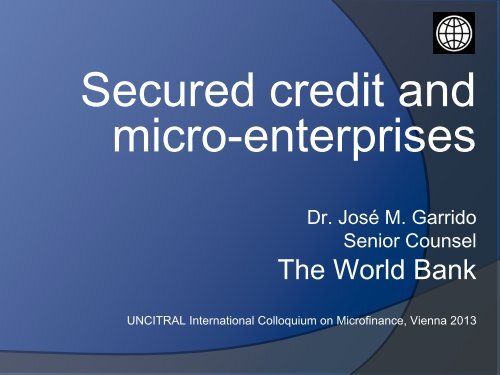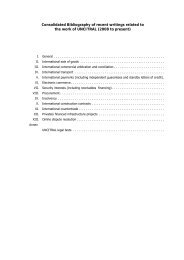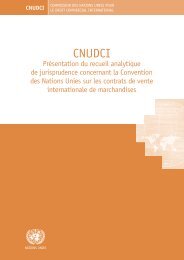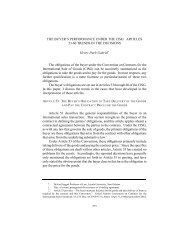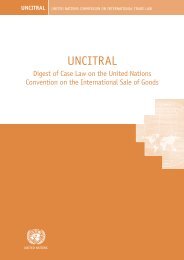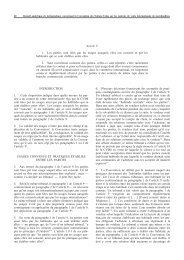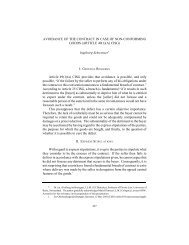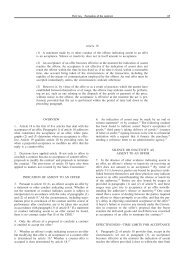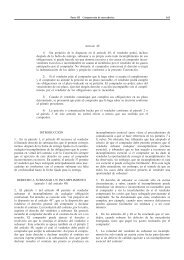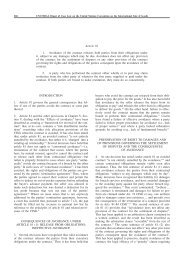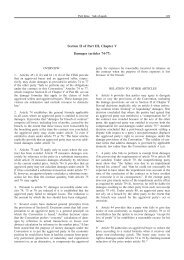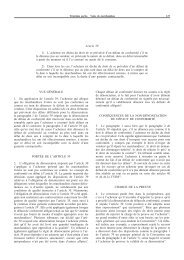Secured credit and micro-enterprises - uncitral
Secured credit and micro-enterprises - uncitral
Secured credit and micro-enterprises - uncitral
Create successful ePaper yourself
Turn your PDF publications into a flip-book with our unique Google optimized e-Paper software.
<strong>Secured</strong> <strong>credit</strong> <strong>and</strong><br />
<strong>micro</strong>-<strong>enterprises</strong><br />
Dr. José M. Garrido<br />
Senior Counsel<br />
The World Bank<br />
UNCITRAL International Colloquium on Microfinance, Vienna 2013
Summary<br />
Introduction: <strong>Secured</strong> <strong>credit</strong> <strong>and</strong> entrepreneurial<br />
activity<br />
Are <strong>micro</strong>-<strong>enterprises</strong> <strong>and</strong> <strong>micro</strong>-finance<br />
institutions different?<br />
Challenges in the use of security interests in<br />
financing <strong>micro</strong>-<strong>enterprises</strong><br />
Adaptations of the framework to the needs of<br />
<strong>micro</strong>-<strong>enterprises</strong><br />
Conclusion<br />
UNCITRAL International Colloquium on Microfinance, Vienna 2013<br />
2
Introduction: <strong>Secured</strong> <strong>credit</strong> <strong>and</strong><br />
entrepreneurial activity<br />
What is the function of secured <strong>credit</strong>?<br />
Competing explanations:<br />
-Risk reduction<br />
-Reduction of<br />
monitoring costs<br />
-Signaling<br />
-Bonding<br />
3
Introduction: <strong>Secured</strong> <strong>credit</strong> <strong>and</strong><br />
entrepreneurial activity<br />
Positive effects of secured <strong>credit</strong> on<br />
entrepreneurial activity: Necessary<br />
features of the regime<br />
-Flexibility<br />
-Non-possessory interests<br />
-Affordable costs, simplicity<br />
-Enforcement<br />
(See Rec. 1 of the Legislative Guide)<br />
UNCITRAL International Colloquium on Microfinance, Vienna 2013<br />
4
Are <strong>micro</strong>-<strong>enterprises</strong> <strong>and</strong> <strong>micro</strong>finance<br />
institutions different?<br />
Credit rationing <strong>and</strong> <strong>micro</strong>-<strong>enterprises</strong><br />
Lack of liquidity<br />
Lack of capital<br />
Numerous problems<br />
in access to finance<br />
The role of <strong>micro</strong>finance<br />
institutions (MFIs)<br />
UNCITRAL International Colloquium on Microfinance, Vienna 2013<br />
5
Are <strong>micro</strong>-<strong>enterprises</strong> <strong>and</strong><br />
<strong>micro</strong>finance institutions different?<br />
A look at some <strong>micro</strong>finance practices:<br />
Selection of borrowers based on repayment<br />
capacity, business plans, other factors<br />
Short term finance, liquidity<br />
Small capital needs<br />
In many countries, very little use of security<br />
interests<br />
6
Are <strong>micro</strong>-<strong>enterprises</strong> <strong>and</strong> <strong>micro</strong>finance<br />
institutions different?<br />
Some examples of <strong>micro</strong>finance<br />
practice <strong>and</strong> the (lack of) use of<br />
security interests:<br />
7
Fundusz Mikro<br />
(Pol<strong>and</strong>)<br />
The <strong>credit</strong> worthiness criteria used<br />
in decision-making are:<br />
(1) Motivation to repay<br />
(2) Entrepreneurship /<br />
Entrepreneurial skills<br />
(3) Business viability<br />
(4) Cash flow coverage<br />
Source: J. Evers – A. Loeft<br />
8
Fundusz Mikro<br />
(Pol<strong>and</strong>)<br />
No physical collateral is accepted by FM because they believe it<br />
would weaken borrowers’ sense of personal responsibility for<br />
repayment. The “motivation” to repay is assessed in-depth,<br />
through the character of the client.<br />
FM aims at establishing a long term relation with the client,<br />
which provides security in itself. The essential security is<br />
provided by the fact that only small loans are available in the<br />
first instance, <strong>and</strong> that new <strong>and</strong> larger loans can only be<br />
obtained if the previous loan is repaid fully <strong>and</strong> on schedule.<br />
Thus, the expectation of a new, larger loan is a form of<br />
security.<br />
Peer pressure or “social collateral” applied through group<br />
members is essential. If one member of the group does not<br />
repay on schedule, follow-up loans will not be available to<br />
anyone in the group.<br />
Source: J. Evers – A. Loeft<br />
9
Policy of Grameen Bank<br />
(Bangladesh)<br />
Grameen Bank does not require any collateral against<br />
its <strong>micro</strong>-loans. Since the bank does not wish to take<br />
any borrower to the court of law in case of non-<br />
repayment, it does not require the borrowers to sign<br />
any legal instrument. Although each borrower must<br />
belong to a five-member group, the group is not<br />
required to give any guarantee for a loan to its<br />
member. Repayment responsibility solely rests on the<br />
individual borrower, while the group <strong>and</strong> the centre<br />
oversee that everyone behaves in a responsible way<br />
<strong>and</strong> none gets into repayment problem. There is no<br />
form of joint liability, i.e. group members are not<br />
responsible to pay on behalf of a defaulting member.<br />
10
Are <strong>micro</strong>-<strong>enterprises</strong> <strong>and</strong> <strong>micro</strong>finance<br />
institutions different?<br />
Less use of security interests, in most countries<br />
Relational lending, use of alternative instruments to<br />
A) assess risk<br />
B) reduce risk<br />
Consideration of the costs<br />
Scarcity of assets<br />
Use of alternative mechanisms:<br />
-Credit relations as a repeat game<br />
-Reputation <strong>and</strong> commitment of the group<br />
-Use of security interests in their “bonding” function<br />
Implications<br />
11
Challenges in the use of security interests<br />
in financing <strong>micro</strong>-<strong>enterprises</strong><br />
Costs<br />
Lack of suitable assets<br />
Necessary possession of some assets<br />
Inadequacy of the legal framework<br />
Risks of loss of the collateral, lack of value<br />
Enforcement<br />
12
Adaptations of the framework to the needs<br />
<strong>micro</strong>-<strong>enterprises</strong><br />
-Use of possessory security interests<br />
-Direct possession<br />
-Indirect possession<br />
-Bonding effect, less risk of loss of<br />
collateral<br />
UNCITRAL International Colloquium on Microfinance, Vienna 2013<br />
13
Adaptations of the framework to the needs<br />
of <strong>micro</strong>-<strong>enterprises</strong><br />
-Security over exempt assets<br />
-Use of reservation of title, acquisition<br />
finance <strong>and</strong> leasing for certain loans<br />
-Use of general security interests<br />
14
Adaptations of the framework to the<br />
needs of <strong>micro</strong>-<strong>enterprises</strong><br />
The problem of costs (low value of loans,<br />
low value of collateral)<br />
A system with no creation or registry costs?<br />
UNCITRAL International Colloquium on Microfinance, Vienna 2013<br />
15
Adaptations of the framework to the<br />
needs of <strong>micro</strong>-<strong>enterprises</strong><br />
Enforcement<br />
MFIs use alternative collection mechanisms<br />
(avoid costs)<br />
Out-of-court enforcement<br />
Legal obstacles <strong>and</strong> debtor protection<br />
UNCITRAL International Colloquium on Microfinance, Vienna 2013<br />
16
Conclusion<br />
o <strong>Secured</strong> Transactions Law as a public<br />
good<br />
o “Functional approach”<br />
o Benefits all kinds of <strong>enterprises</strong><br />
o Minor adaptations for <strong>micro</strong><strong>enterprises</strong><br />
o But <strong>micro</strong><strong>enterprises</strong> have other<br />
challenges: transparency, financial<br />
consumer protection, collection<br />
practices, insolvency<br />
17


